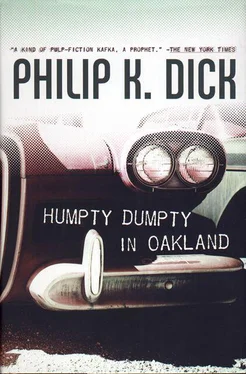He said, “I think we’ll go on as soon as we get to Salt Lake.” Getting out the map, he examined the possibilities. A town small enough to be unimportant to the Harman organization, but large enough so that he could get a job or go into business. Open a used-car lot, he thought. There would be enough money, just barely enough, if he bought wisely.
“I’d like to see Salt Lake City,” Julie said. “I’ve always wanted to.”
“So would I,” he said.
“But we can’t.” She studied him.
“No,” he said.
“I have no say-so in this?”
He said, “You better let me decide.”
Julie went on eating then. So he did too.
After they had left the café they walked slowly back in the direction of the parked Greyhound bus. They could see the driver; he was off talking to two middle-aged women. So they did not hurry.
“This is a very pretty little town,” Julie said. “But there’s nothing doing here. We’ve seen it all. It’s just a place for people to stop and eat and get their cars fixed and do a little last gambling.” Turning toward him, she said, “Do you feel safer here? Probably not. You’ll never feel safe. It’s really inside you.”
“What is?” he said.
“The conflict. The thing you’re running away from. Psychologists say we carry our problems with us.”
He said, “Maybe so.” He did not feel like arguing with her.
They came to the bus. The door was open, and he started to ascend the metal steps.
“I don’t believe I’ll get on,” Julie said.
“Okay,” he said, stepping back to the ground.
“At all.” She did not flinch; she met his gaze. “I’ve decided I don’t want to go any farther. I think there’s something you’re not facing in yourself; that you’ve never faced. And you’re dragging me along. If you try to force me to get on the bus, I’ll scream and they’ll stop you. I see a highway patrolman or somebody over there.” She nodded her head; he saw the parked patrol car with its antenna.
“You’re going to stay in Wendover?” he said, in agony.
“No. I’m going to take the next bus back to Reno, and I’m going to stay there a few days and do some shopping, and then if I like it there I’ll stay there and get a Nevada divorce, and of course get a job there. And if I don’t like it, I’ll go on back to Oakland. And get a California divorce.”
“On what?”
“Won’t you give me part of the money?”
He was silent. Other passengers, seeing them at the bus, were beginning to come, afraid they might be left behind. The driver was winding up his conversation with the middle-aged women.
“I want you to come back with me,” Julie said. “But probably you won’t; you’ll go on fleeing.”
He groaned.
“Yes,” she said. “Groan, because you know it’s the truth.”
He said, “It’s crap.”
“Just give me some of the money. Not even half. Just, say, five hundred dollars. I know how much there is; that leaves you almost fifteen hundred. Under California joint-property law, half of it is mine. But I don’t care. I just want to end this—pathology. This—” She broke off. Other people were going by them and up into the bus.
Al said, “I’ll have to sign the traveler’s checks or they won’t be good.”
“Fine,” she said.
Holding the checks up against the side of the bus, he signed five hundred dollars’ worth. He gave them to his wife.
“Well,” she said quietly, “you did just give me five hundred. I thought maybe you’d volunteer half. Well, it doesn’t matter.” Tears filled her eyes, and then she turned to the driver, who had come up, and said, “I’d like my luggage; I’m not going on. May I, please?” She held out the claim check. The driver glanced at her, then at Al, and then accepted the claim check.
Al got onto the bus and reseated himself, alone. Below, on the outside, the driver was unloading Julie’s suitcase. He slammed the metal door shut after the suitcase and then hurried up into the bus to seat himself at the wheel. A moment later the motor roared on; gray smoke poured from the exhaust. The remaining passengers got quickly on and found their seats.
Seated in the bus, Al saw his wife walk away with her suitcase, into the bus depot. The door closed after her. And then the doors of the bus shut and the bus began to move.
He felt the rift, the ghastly, purposeless rift. What did it matter now whether he went on or not? But he was going on; he was on his way alone to Salt Lake City and whatever came after that. Maybe this is better, he thought. For us to separate. At least they won’t get both of us. It was hopeless from the start to try to make her go along. He thought, You can’t force people to do anything. I can’t make Julie do what I want her to do, any more than Lydia Fergesson could force me to send flowers or go to the mortuary. Each of us has his own life to live out, for better or worse.
The Great Salt Lake was enormously hot, white and unsteady. Toward midday the bus had crossed it and had reached the fertile green part of Utah with trees and small lakes; once more he saw countryside not much different from California. There was quite a bit of traffic on the highway. He saw, ahead, the beginnings of a large city.
He found Salt Lake City as crowded and busy and built-up as the Bay Area; it, like Oakland, had other smaller cities so close to it that they merged. Residential and business districts, he thought as he gazed out the bus window, were about the same everywhere. Motels, drugstores, gas stations, cleaning establishments, dime stores . . . the houses seemed to be mostly of brick or stone, or, if of wood, unusually substantial. The streets were well maintained and noisy. He saw a lot of teenagers and their cars, the modified hot rods that he saw all day long going back and forth along San Pablo Avenue.
In many ways, he decided, Salt Lake City appeared to be an ideal town for a used-car business. Everyone seemed to drive, and there were plenty of older cars to be seen.
When he got off the bus in downtown Salt Lake City, two plainclothes policemen took hold of him and led him off to one side of the depot. “Are you Allen Miller of Oakland, California?” one of them asked him, showing his badge.
He was so completely cut down that he nodded yes.
“We have a warrant for your arrest,” the plainclothes policeman said, showing him a folded paper, “and return to the State of California.” They began to move him, between them, toward the curb and their parked police car.
“What for?” Al demanded.
“For fraud,” one of them said as they pushed him into the car. “Obtaining money under false pretenses.”
“What money?” he demanded. “Who says so?”
“The litigant signing the complaint in the County of Alameda, California; Mrs. Lydia Fergesson.” The policeman started up the car, and they drove off into downtown Salt Lake City traffic. Meanwhile, in the back of the car, the other policeman was searching Al; he offered no resistance. “You’ll be here a couple of days and then you’ll be on your way back.”
Al could think of nothing to say.
“You know this Mrs. Fergesson?” one of the policemen said to him, with a wink at the other.
“Sure,” Al said.
After a time one of the policemen said, “Is she a widow?”
Al said, “Yes.”
“Fat? Middle-aged?”
Al said nothing.
“What’s your stated occupation?” one of the policemen said.
“Car salesman,” Al said.
“You’ve gone up in the world,” the policeman said, and chuckled.
Transportation arrangements were made the next day. With another male prisoner of the State of Utah, he was sent back to California in the custody of a sheriff’s deputy; they made the trip by air, and within a few hours after leaving the Salt Lake City airport they were landing at the Oakland airport. There, a police car met them and they were taken to the Oakland Hall of Justice.
Читать дальше










